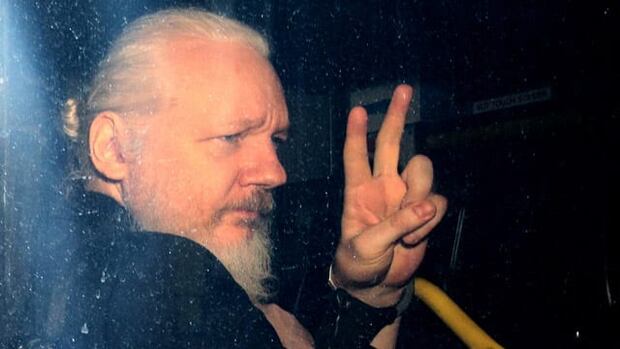Trump associate Roger Stone leaves 1st day of trial, complaining of food poisoning
Stone accused of lying to FBI about co-ordination with WikiLeaks for damaging info on Democrats

The trial of Roger Stone, the flamboyant former confidant of U.S. President Donald Trump, kicked off Tuesday amid a host of medical issues involving both the defendant and a spectator.
Shortly after jury selection began, the courtroom had to be cleared for more than half an hour when a man sitting in the back row moaned loudly and collapsed on the floor. He was revived and helped from the room by medical staff.
Not long after the session resumed, Stone himself went home early, telling U.S. District Judge Amy Berman Jackson that he had food poisoning.
Stone faces charges related to allegations he sought to collaborate with WikiLeaks to release emails hacked by Russia to damage Hillary Clinton's 2016 Democratic presidential campaign.
The trial in Federal Court in Washington, which began Tuesday, promises to revive the spectre of special counsel Robert Mueller's investigation as the impeachment inquiry against Trump proceeds in the House.
Stone's indictment in January was an offshoot of Mueller's investigation. Stone is accused of lying to lawmakers about WikiLeaks, tampering with witnesses and obstructing a House intelligence committee probe into whether the Trump campaign co-ordinated with Russia to tip the 2016 election.
A self-proclaimed dirty trickster with a flair for public drama, Stone has a history in Republican political circles dating back to the Nixon administration. He has consistently criticized the case against him as politically motivated. His trial's first day was focused on jury selection and featured some of the political complexities that may dominate the case.
Government workers allowed in jury pool
Jackson started the day by fending off attempts by the defence team to exclude any potential jurors who worked in the U.S. government or had a negative view of Trump. She pointed out that excluding all government workers may be impossible given the nature of the District of Columbia jury pool.
Sure enough, the first potential juror was a woman who had worked in the Office of Management and Budget in the Obama White House and whose husband is a lawyer in the Department of Justice.
Jackson also rejected the notion that a juror who was opposed to Trump would not be fair to Stone.
"That doesn't mean the juror is biased against this defendant on these charges," Jackson told defence attorneys. "The defence has assumed bias that has not been shown on the part of those people."
Stone, a longtime friend of the president, briefly served on Trump's campaign but was pushed out amid infighting with campaign manager Corey Lewandowski. Though sidelined, he continued to communicate with Trump and stayed plugged into his circle of advisers.
The indictment says Stone, who was arrested by the FBI in a raid at his Florida home, repeatedly discussed WikiLeaks in 2016 with campaign associates and lays out in detail Stone's conversations about emails stolen from Clinton campaign chairman John Podesta and posted in the weeks before Trump beat Clinton.
After WikiLeaks on July 22, 2016, released hacked emails from the Democratic National Committee, the indictment says, a senior Trump campaign official "was directed" to contact Stone about additional releases and "what other damaging information" WikiLeaks had "regarding the Clinton campaign." The indictment does not name the official or say who directed the outreach to Stone.
Stone also is accused of threatening New York radio host Randy Credico in an effort to prevent Credico from contradicting Stone's testimony before the House intelligence committee.
Relationship with Trump since the '80s
Stone is among several Trump associates to be charged criminally for various charges, which have included lying to Congress or the FBI, bank and tax fraud, and failing to register as a foreign agent for lobbying purposes. The list includes his former personal attorney Michael Cohen, his presidential campaign chair, Paul Manafort and Manafort's colleague, Rick Gates, former national security adviser Michael Flynn and campaign foreign policy adviser George Papadopoulos.
While Trump has tried to downplay the extent of his personal relationship with some of those men, the links between Stone and Trump stretch back decades.
The real estate tycoon Trump was a client of the lobbying firm Black, Manafort and Stone beginning in the 1980s, and admitted in the documentary Get Me Roger Stone that the Republican operative has long groomed him for a run for political office. Stone was often by Trump's side as he talked up a possible 2000 bid for president as a candidate of the Reform Party.
In 2015, Stone was on board as Trump launched his bid for president as a Republican, but left the campaign under unclear circumstances in August that year, soon after Lewandowski took over as campaign chair. But as details of the indictment made clear, Stone was regularly in touch with Trump campaign officials through the election and into the transition.
Trump as recently as December 2018 defended Stone and praised his unwillingness to co-operate with authorities.
With files from CBC News

